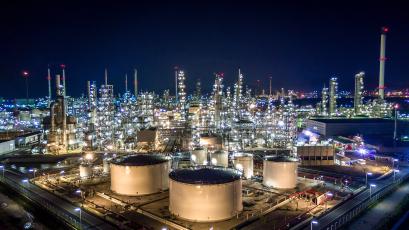Plastic roads and buildings, the influence of energy and petrochemicals in geopolitics, and chemical and molecular recycling processes that could create a truly circular economy for plastic products were just a few of the topics discussed at AFPM’s 44th International Petrochemical Conference (IPC) in San Antonio last week. With the theme “Petrochemicals as Drivers of Global Progress,” IPC 2019 included appearances from former North American leaders Vice President Dick Cheney, former Prime Minister Stephen Harper of Canada, and former President Felipe Calderon of Mexico; bestselling author and foreign affairs expert Robert Kaplan; foremost leaders from the petrochemical industry such as BASF CEO Wayne Smith, LyondellBasell Vice President & Chief Accounting Officer Jacinth Smiley, and James and Albert Chao of Westlake Chemical; and many other experts and visionaries, all sharing views on the intrinsic role of petrochemicals in the future. Below are six highlights from this year’s conference.

AFPM President and CEO Chet Thompson opened this year’s International Petrochemical Conference by explaining how petrochemical products form the underpinnings of the global economy and provide the building blocks for thousands of innovations that make our modern lives possible.
“From the propylene in life-saving heart valves to the ethylene used to make EVA films for solar panels, to countless other applications for our products we have yet to uncover, our products and industry will be there to move humanity forward,” said Thompson.
James and Albert Chao, co-founders of Westlake Chemical and recipients of this year’s Petrochemical Heritage Award, spoke about the remarkable contributions of petrochemicals and plastics to the world, citing that petrochemicals contribute $5.7 trillion dollars annually to the global economy and create millions of jobs.

The role of the petrochemicals industry in a sustainable future — including managing plastic waste and advancing a circular economy — permeated discussions at IPC
Petrochemical companies continue making new breakthroughs that will drive industry sustainability through chemical and mechanical recycling, with the ultimate goal of creating a true circular economy for petrochemicals and plastic products. Subject matter experts from the petrochemical industry, academia, and the investment community discussed how they could collaborate on projects that ensure the immense value that petrochemicals provide is maintained while the issue of plastic waste is addressed in a meaningful way. To this end, petrochemical companies have also remained highly active on the issue of plastic waste. Westlake Chemical, for example, has launched an initiative to work with recyclers and municipalities to capture plastic that can be reused for housing and other construction. And a significant number of AFPM members have joined the Alliance to End Plastic Waste, which is initially raising $1.5 billion to mitigate the accumulation of plastic trash across the globe.
Thompson also acknowledged the petrochemical industry is facing significant challenges. He advised that now more than ever, the industry must stand its ground and ensure that both policymakers and the public understand fully the importance of petrochemicals for our future, despite a political climate that has become increasingly opposed to petrochemicals and plastic products.
“We must not flinch or hide in response to this new political reality,” said Thompson. “Rather, we must continue to engage … we need them to know that product bans, use restrictions for petrochemical derivatives, and proposals like the Green New Deal are simply out of touch with the immense value that our industry delivers to the world and to humanity every day.”
In vehicle design, petrochemicals are quite literally driving the future. In AFPM’s “Future of Mobility” panel, experts discussed emerging trends in the automotive and mobility landscape and how petrochemicals will remain an integral part of transportation. Over 50 percent of the materials in today’s cars include petrochemical products, according to panel moderator Dr. Robert Kumpf, and as new petrochemical innovations are developed, vehicles are increasingly glued and bonded together during production instead of being welded.
Michael Hickner, a chemistry professor at Penn State University, underscored Dr. Kumpf’s remarks, stating that there isn’t a single component of a car that can’t be replaced by a synthetic product made from petrochemicals. He predicts that, in the future, most of buildings and roads will be made of plastic. Given the large environmental footprint of concrete and the high cost of metals, manufacturers will increasingly turn to petrochemical products and plastics as a primary source material for production.
Petrochemicals, oil and natural gas are the ‘secret sauce’ to understanding geopolitics. Bestselling author, foreign affairs expert and managing director of the Eurasia Group Robert Kaplan discussed the key role of energy and petroleum in geopolitics and its continued relevance well into the future. In his wide-ranging discussion, Kaplan explained few people in the media understand the outsized role of petrochemicals, as well as oil and gas, in geopolitics, stating “energy is the secret sauce for explaining European and Middle Eastern politics.”
Kaplan also highlighted the importance of healthy trading relationships and a robust North American energy infrastructure, noting that the failure to quickly approve Keystone XL by the U.S. is a big missed opportunity to further connect Canadian energy resources to the U.S. and create a ‘greater North American energy sphere.’” Concluding by touching on a key global trend, Kaplan noted that the world economy and globalization will continue to develop, while trends such as nationalism pass in a decade or so. For that reason, energy will continue to be consumed at greater and greater levels in the coming years.

Enhanced inclusion practices — not just increased diversity — are vital for a stronger petrochemical industry workforce. While closely linked to diversity, workforce inclusion is the fair and respectful treatment of all employees and teammates, ensuring that they have equal opportunities to contribute to the progress and success of the enterprise. Companies are increasingly recognizing that diverse and inclusive teams that bring a range of perspectives are critical to achieving optimal results.
Dr. Steve Robbins, diversity and human behavioral expert, moderated the IPC panel on the value of workforce diversity and inclusion. Robbins highlighted how the human brain is conditioned to identify patterns – leading to quick assumptions about people with specific traits or backgrounds – ultimately impacting how we make decisions in the workplace, sometimes to the detriment of building diverse teams. Panelists from Dow, BASF and LyondellBasell joined the discussion, sharing how the industry has increasingly placed an emphasis on only on diversity but on fostering workplace inclusion. While diversity is relatively quantifiable based on demographic information, inclusion can be more elusive to measure. A workforce’s level of engagement, views about access and relationship to leadership, and overall satisfaction can all serve as indicators of inclusion.
Some of the specific practices that petrochemical companies are implementing to foster a more diverse and inclusive workforce include mandates for a diverse set of candidates to fill open positions, regardless of ultimate outcome, as well as implementing multiple layers of governance so that inclusion ambition statements are fully realized. Ultimately, diversity and inclusion start with wanting to do the right thing — but inevitably, rewards for the business follow.

Former North American leaders are united on the critical role that NAFTA will continue to play in the health of U.S. energy and petrochemical industries.
Former U.S. Vice President Dick Cheney, Former Prime Minister Stephen Harper of Canada and Former President Felipe Calderon of Mexico joined AFPM President and CEO Chet Thompson for a panel discussion on North American geopolitics and the energy and petrochemical industries. With roughly 30 percent of U.S. energy exports going to Mexico and about 40 percent of U.S. crude feed coming from Canada, a healthy and cooperative trade relationship between the three nations is an imperative for a strong North American energy block.
The leaders were unanimous in their view that North America should be given every possible advantage to foster a healthy trading relationship that further strengthens North America’s energy and petrochemical industries.
“North America has been able to compete with Asia and other nations because of the integration of NAFTA,” said Former President Calderon, who cited the large and vibrant trading relationship between the U.S. and Mexico, with $1.5 billion in goods crossing the border between the countries every day.
Former Prime Minister Harper also stressed the importance of healthy trade between the U.S. and Canada, calling it “the single largest trade relationship in the history of the world.”
Harper also underscored the critical role of petroleum products in creating the modern world.
“Anyone who says hydrocarbons are going to diminish in use is wrong, factually,” said Harper.
The leaders concurred that in the short and mid-term, there’s simply no way of driving economic growth without energy and the use of hydrocarbons.
“We wouldn’t have the lives, healthcare, transportation and life expectancy today without hydrocarbons,” Cheney reminded the audience. “We shouldn’t forget that.”


